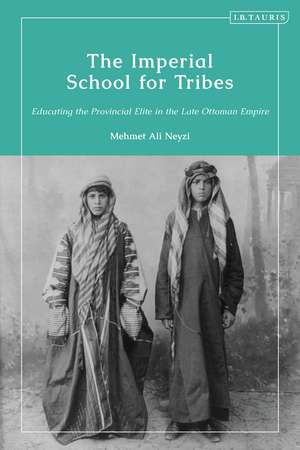The Imperial School for Tribes: Educating the Provincial Elite in the Late Ottoman Empire
Autor Mehmet Ali Neyzien Limba Engleză Hardback – 3 mai 2023
Preț: 510.49 lei
Preț vechi: 731.25 lei
-30% Nou
Puncte Express: 766
Preț estimativ în valută:
97.68€ • 102.26$ • 80.83£
97.68€ • 102.26$ • 80.83£
Carte tipărită la comandă
Livrare economică 05-19 aprilie
Preluare comenzi: 021 569.72.76
Specificații
ISBN-13: 9780755649747
ISBN-10: 0755649745
Pagini: 240
Dimensiuni: 156 x 234 mm
Greutate: 0.51 kg
Editura: Bloomsbury Publishing
Colecția I.B.Tauris
Locul publicării:London, United Kingdom
ISBN-10: 0755649745
Pagini: 240
Dimensiuni: 156 x 234 mm
Greutate: 0.51 kg
Editura: Bloomsbury Publishing
Colecția I.B.Tauris
Locul publicării:London, United Kingdom
Caracteristici
Uses new sources recently made available in the Ottoman archives as well, Ottoman newspaper collections in Istanbul and Beirut, and memoirs of graduates such as Omar Mansour to reconstruct the life of the school
Notă biografică
Mehmet Ali Neyzi holds a PhD in Middle Eastern history from the American University of Beirut, Lebanon. A graduate of Princeton University, USA, prior to academia he pursued a successful business career and was CEO of several large companies.
Cuprins
IntroductionChapter 1 - The Asiret Mektebi : A Chronology Chapter 2 - Recruitment and Placement The Inauguration Quotas Vs Actual Enrollment Greater Syria Hijaz and Yemen Libya Iraq Kurds, Albanians and Javanese A New Breed of Soldiers and BureaucratsChapter 3 - Educators and Curriculum Directors of the School Curriculum Chapter 4 - Lifestories - Greater Syria The No-Man's-Land of Deir Ez-Zor Ramadan Shallash, National Hero or Collaborator? The Hawran Druze Fahd al-Atrash and His Family The Merhebis of Akkar Chapter 5 - Lifestories - Libya The Memoirs of a Graduate - Omar Mansour "Arap Kaymakam" - Orhan Kologlu The Sons of Sheikh Zafir and Other Libyan StudentsChapter 6 - Lifestories - Iraq The Saadun Family of Muntafiq The Prime Minister Who Committed Suicide - Abdulmuhsin SaadunConclusion
Recenzii
Neyzi's fine study uncovers an important but rarely-studied subject in Modern Middle East history. It brings together the imperial and local/tribal in the example of Abdulhamid's School for Tribes and using hitherto-unused primary sources. A must-read.
An exhaustive study of a short-lived yet venerable Ottoman educational institution and its notable alumni, who hailed from the margins of the empire and rose to prominence during the empire-to-nation transition in the Middle East.
This book offers a unique perspective on nineteenth century Ottoman efforts at modernization and reforms designed to keep the empire together. One ambitious project was a boarding school in Istanbul for the sons of the tribal leaders. In this well-written book, Neyzi skillfully examines the school and its legacy through the lives and careers of its Arab graduates.
In charting the history of Sultan Abdulhamid's Asiret Mektebi, Mehmet Ali Neyzi's superbly researched book makes a pivotal contribution to our understanding of state-building in the Late Ottoman Empire. It casts new light on the tribal politics of the Hamidian era and deftly links the 'Imperial School for the Tribes' to the history of the 'Last Ottoman Generation' in Libya and the Fertile Crescent, documenting the role of its most prominent graduates in the complex history of anti-colonial resistance and imperial collaboration that accompanied the shift to a European dominated state system.
An exhaustive study of a short-lived yet venerable Ottoman educational institution and its notable alumni, who hailed from the margins of the empire and rose to prominence during the empire-to-nation transition in the Middle East.
This book offers a unique perspective on nineteenth century Ottoman efforts at modernization and reforms designed to keep the empire together. One ambitious project was a boarding school in Istanbul for the sons of the tribal leaders. In this well-written book, Neyzi skillfully examines the school and its legacy through the lives and careers of its Arab graduates.
In charting the history of Sultan Abdulhamid's Asiret Mektebi, Mehmet Ali Neyzi's superbly researched book makes a pivotal contribution to our understanding of state-building in the Late Ottoman Empire. It casts new light on the tribal politics of the Hamidian era and deftly links the 'Imperial School for the Tribes' to the history of the 'Last Ottoman Generation' in Libya and the Fertile Crescent, documenting the role of its most prominent graduates in the complex history of anti-colonial resistance and imperial collaboration that accompanied the shift to a European dominated state system.
